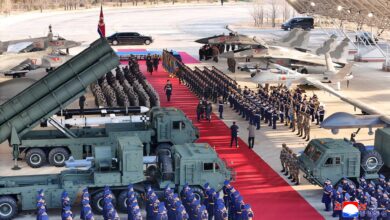One day the main force of the Korean People’s Revolutionary Army engaged a Japanese “punitive” force near Limingshui, and destroyed it after fierce fighting. Then it swiftly left the spot on a forced march.
Suddenly a halt was ordered, and the soldiers slumped to the ground in weariness. They thought they were to have a break.
“Comrades,” said Kim Il Sung. “We have one more thing to do. We’ve not buried a fallen comrade.”
The soldiers tensed. It flashed through their minds that they had left a fallen comrade unburied in the rush to fight and then to depart.
The unit was now a good 40 km away from the site, a snowstorm raging fiercer and the way back hopelessly blurred.
“We will go back and bury him,” said the Commander firmly.
He turned around, and led the unit, wading through waist-deep snow. From then on, the Commander went without sleep or meal for two days until the soldier’s body was found. He burst into tears, gently stroking the body.
Snowflakes poured down on the frozen face of the deceased, never melting. The soldiers dug the iron-hard ground, suppressing their sobs.
Soon a grave appeared in the snow-carpeted thicket.

